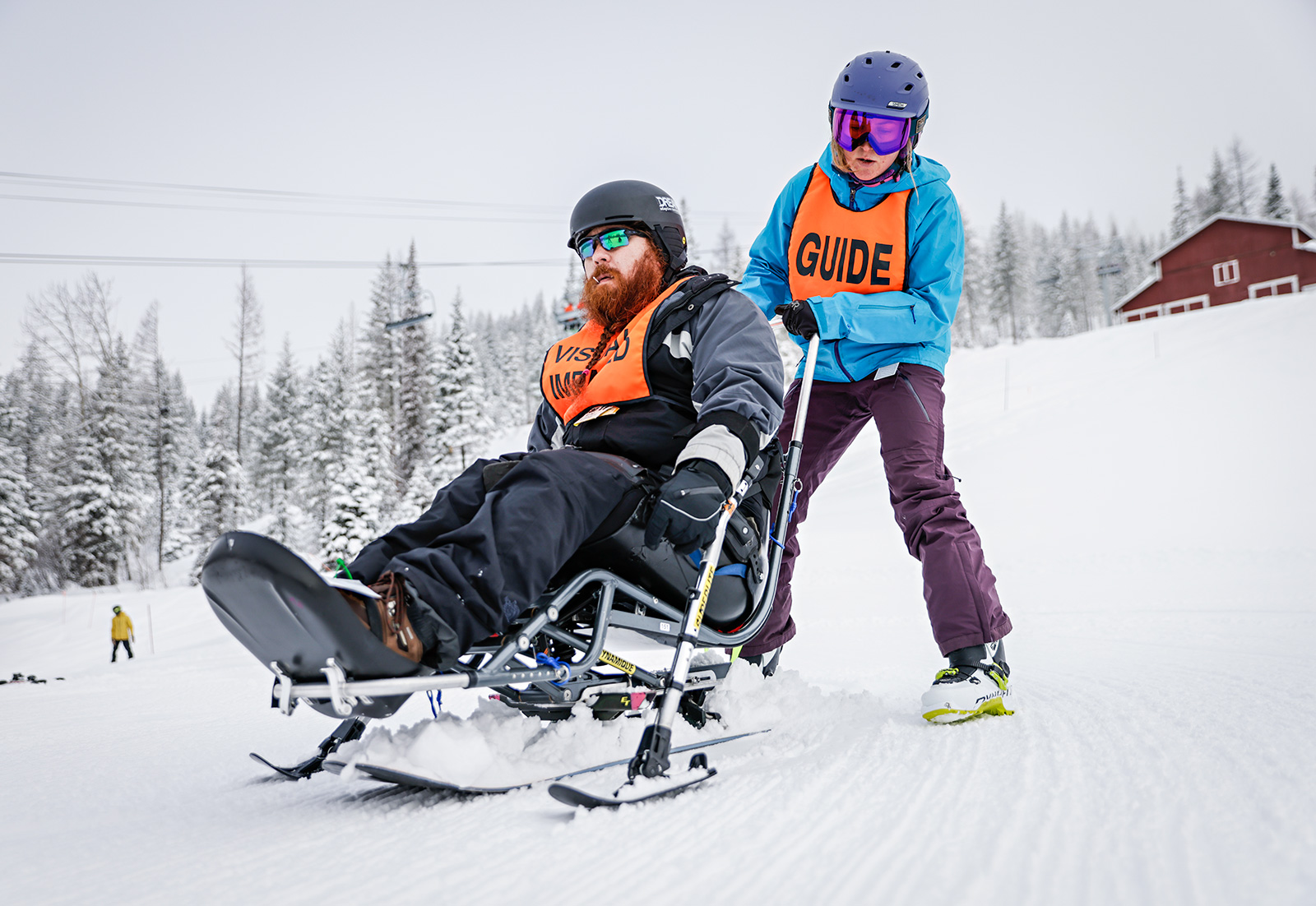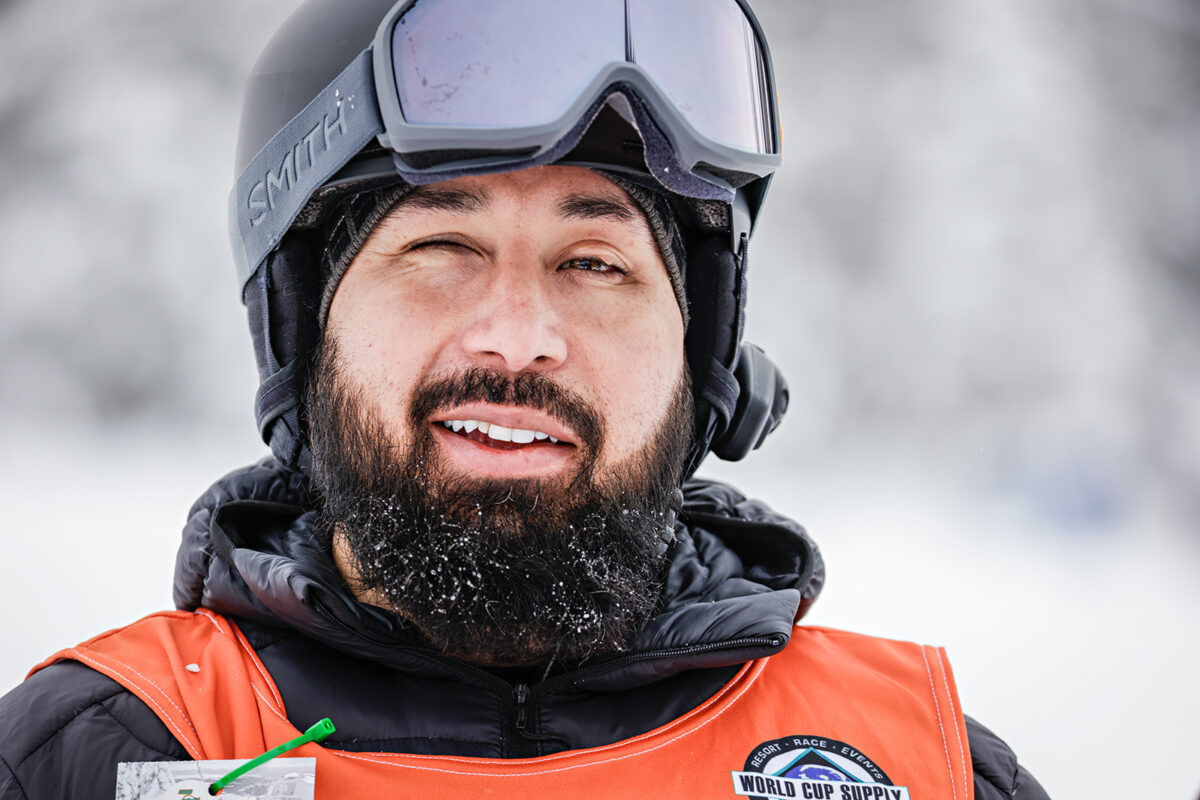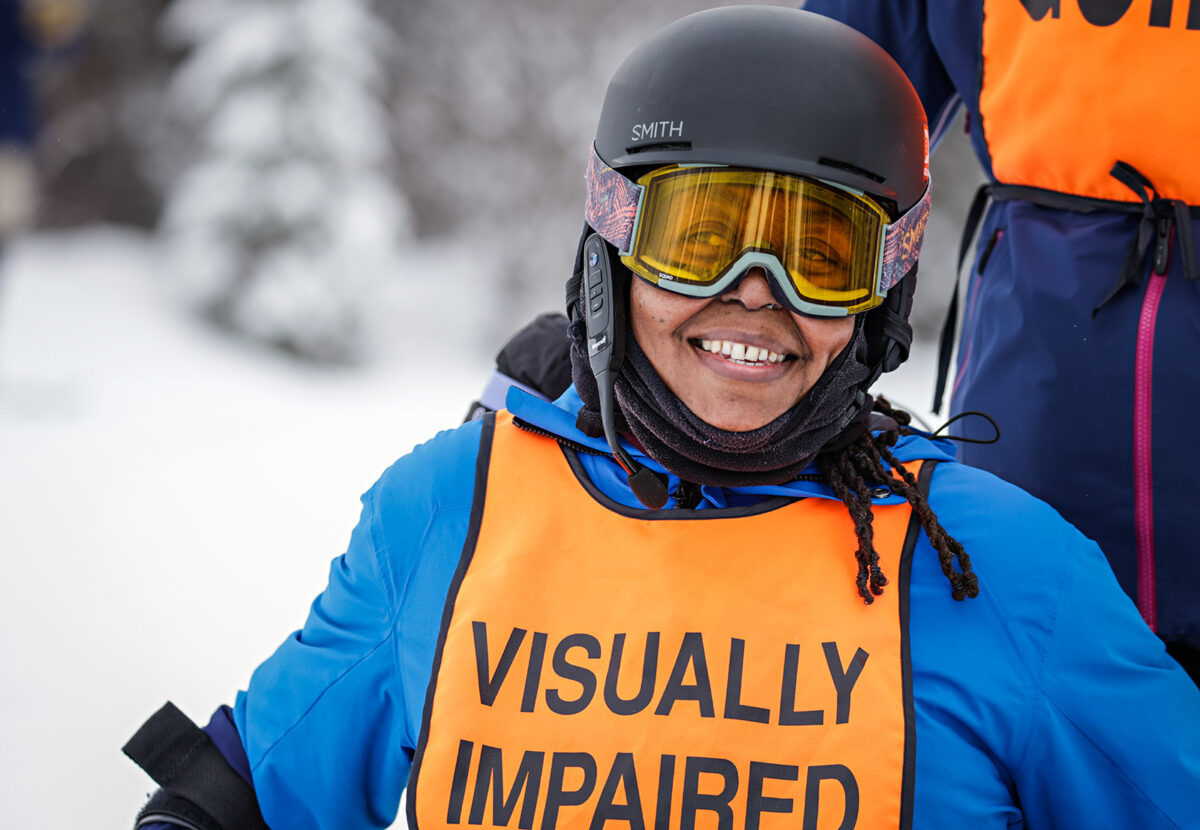The Athlete Within
DREAM Adaptive Recreation recently partnered with the Whitefish Veterans Support Team to offer instruction and equipment for visually impaired veterans on Big Mountain while the nonprofit works to meet the rising demand for adaptive sports
By Maggie Dresser
In 2004, when Ajay Mohammed was stationed in Iraq with the United States Navy, he suffered glass injuries to his eyes during an ambush, costing him his vision in his right eye and causing him to lose the ability to perceive shapes, shadows and light perception in his left eye.
After six years in the military, Mohammed had a difficult time transitioning back into society following his eye injuries. He returned home to Wisconsin, where he spent years sulking over the trauma that left him unable to see the world.
A decade after he lost his vision, Mohammad reluctantly agreed to attend an adaptive sports camp in Florida after his social worker persuaded him to go. At the camp, organized by the Navy Safe Harbor Warrior Foundation, veterans were introduced to sports like cycling, track, swimming and archery. Mohammed says the plane ride to Florida was a pivotal moment in his life.
“I spent seven years in my dad’s basement trying to find my way back out,” Mohammed said. “In 2014, I went to my first sports camp — I fell in love with adaptive sports and being outdoors.”
While Mohammed was introduced to adaptive sports at the camp, he also met other veterans who were working to overcome their disabilities and trauma, which inspired him to view the world through a more positive lens, despite his visual impairment.
“When you exit the military, a big portion of your identity is with communities and other people that have suffered,” Mohammed said. “Being around other veterans and hearing their stories, sharing their triumphs and the bonding that happens through that is something that cannot be explained.”
In the last decade, Mohammed, who is now 41, has dabbled in different adaptive sports, including whitewater kayaking, golf, bow hunting and rock climbing. He has attended a variety of adaptive sports camps, including most recently the Whitefish Veterans Support Team (WVST), a local nonprofit referred to him by a friend, and which hosts retreats involving winter and summer sports and wellness retreats.
Mohammed registered for the retreat and, last week, spent three days with five other veterans learning how to snowboard at Whitefish Mountain Resort (WMR). The group also teamed up with DREAM Adaptive Recreation, an adaptive sports nonprofit based at the ski hill.

WVST founder Steve Shea, a Whitefish resident and West Point Military Academy graduate, launched the program in 2009 to create a therapeutic retreat for veterans that incorporated outdoor activities. The organization has hosted many retreats over the past 15 years, with different focuses each time. Last year, they hosted paratroopers who had assisted in the withdrawal of forces from the War in Afghanistan.
This winter, Shea chose to focus the retreat on visually impaired veterans after watching a “The Long River Home,” a film he saw at the Banff Mountain Film Festival that featured Lonnie Bedwell, a blind veteran who kayaked the Grand Canyon.
“Every veteran will come home from wars, and they need to figure out how to live their lives again,” Shea said. “That transition part is really hard and Lonnie’s attitude and outlook on life is that you can look forward.”
To host the visually impaired veterans, WVST teamed up with DREAM to teach skiing and snowboarding on Big Mountain.
DREAM Adaptive Executive Director Julie Tickle said their organization has collaborated with WVST in the past, but this was the first formal partnership.
“As they formed the Whitefish Veterans Support Team, Steve recognized that many of the veterans have disabilities and needed unique support,” Tickle said. “It was a perfect pairing to bring the veterans here.”
Since Montana has one of the highest per capita populations of veterans, Tickle says DREAM works with veterans regularly, hosting three veteran-specific weekends per year during the summer and the winter. While they lead the adaptive sports portion of the program, organizers also partner with counselors to offer therapeutic services.
“With the veterans’ program, there’s a camaraderie piece and social piece,” Tickle said. “It’s moving their bodies in the great outdoors and for the veteran population, it’s really important. There’s another piece of integrating back into the community and a way to do that is to meet other veterans. It’s a way to come into a safe and supportive environment where they feel empowered.”
Yoneka Trent joined the retreat this year after Bedwell reached out to her about the program. She had never been on skis before, even before she lost her vision to an eye disease five years ago. In 2018, she woke up blind and later learned that she suffered from macular degeneration and Fuchs’ dystrophy, which damaged her cornea and retina.
Prior to the loss of her vision, 57-year-old Trent served eight years in the U.S. Army as a military police officer in Germany and the United States. She eventually attended a Department of Veterans Affairs Blind and Visual Impairment Rehabilitation program, where she learned how to manage her disability. Now, she regularly participates in adaptive sports like kayaking, cycling, archery and horse therapy.
“In the military, we are all athletes,” Trent said. “I was able to find the athlete within. I just feel so much better instead of sitting in a house with four walls — it’s easier to get out here and experience the camaraderie with other veterans.”

For the last 37 years, DREAM has been providing adaptive sports opportunities to people with both cognitive and physical disabilities with a goal of empowering people through outdoor recreation. The nonprofit launched five years before Congress enacted the Americans with Disabilities Act (ADA) and was designed to create outdoor recreation accessibility.
Early projects with the organization included wheelchair accessible hiking trails in Glacier National Park and Woodland Park in Kalispell, but the program has since evolved into helping disabled folks ski on Big Mountain, paddle board and mountain bike in the region.
As the program has grown over the last three decades, so has the staff, volunteers and equipment. There are 150 volunteers, the ski program is now in its 34th year on Big Mountain and equipment has evolved to create more access for people with a variety of disabilities. For example, DREAM regularly uses sit skis — an adaptive ski designed to allow the skier to sit down while also using hand-held skis — in the program.
“That’s one of the ways we are breaking down barriers,” Tickle said. “We are providing the equipment and the training.”
Tickle said the demand for DREAM’s programs are continuing to rise, keeping up with Flathead Valley’s growth pace. There’s currently a waitlist for the nonprofit’s programming, and the staff is constantly working to fundraise and secure grants. Adaptive equipment is increasingly expensive, and Tickle said sit skis cost anywhere from $6,000 to $10,000 while adaptive mountain bikes cost as much as $20,000.
“That’s one of the big barriers,” Tickle said.
A lack of space is another barrier for DREAM staff, Tickle said. A trailer and a small building in the Spruce parking lot at WMR currently serve as their headquarters, and the organization is working to expand the organization along with their facility to keep up with demand. Resort officials donated a half-acre to the nonprofit to designate a DREAM center on the mountain.
The future facility will be able to serve more clients in a private space on the mountain while providing storage and a maintenance area for their equipment.
“We’ve got big plans, and the goal is to serve more people,” Tickle said. “We have people on waitlists and the center will be year-round,” Tickle said.
For Mohammed, he is grateful to have access to snowboarding instruction and equipment with DREAM and WVST. He tried learning the sport on his own before he came to Whitefish, but he said he fell a lot more without any instruction.
Before he was in the Navy, he had never tried sports like snowboarding or whitewater kayaking. He said since the ambush in Iraq, he feels more confident and inspired to try new things.
“It’s been a blessing and a curse being visually impaired,” Mohammad said. “It makes me more comfortable. I don’t see things that would probably make me feel more anxious. I don’t see the trees. I don’t see the people. It’s just me and the board and being out allows me to be comfortable, to have fun and to enjoy where I’m at.”